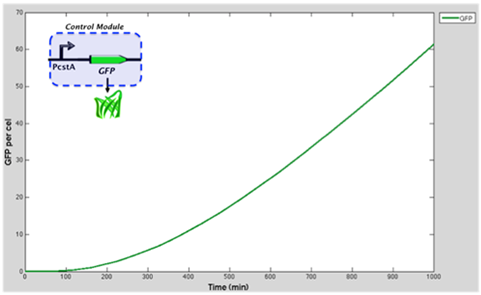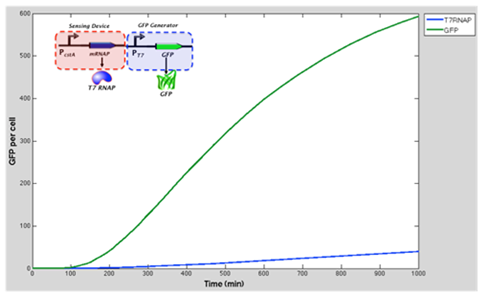Team:University College London/Module 4/Modelling
From 2012.igem.org
(→Modelling) |
(→Modelling) |
||
| Line 14: | Line 14: | ||
[[File:buoygraph1.png]] | [[File:buoygraph1.png]] | ||
| + | Graph represents the GFP accummulation through time when is controlled by cstA promoter | ||
[[File:buoygraph2.png]] | [[File:buoygraph2.png]] | ||
| + | A green line represents GFP expression levels and a blue one shows the T7 RNAP concentration over time. The GFP production is sharply higher then in the previous model. | ||
{{:Team:University_College_London/templates/foot}} | {{:Team:University_College_London/templates/foot}} | ||
Revision as of 18:50, 25 September 2012
Module 4: Buoyancy
Description | Design | Construction | Characterisation | Modelling | Results | Conclusions
Modelling
The block diagram shows the module where GFP expression is control by cstA promoter; the expression is triggered under low glucose concentrations.
In the models the environmental sensitive promoters (cstA) is activated by carbon starvation stress, then the mRNA encoding T7 RNA polymerase is transcribed, whose protein binds the T7 promoter driving the expression of the the reporter output (GFP).
 Graph represents the GFP accummulation through time when is controlled by cstA promoter
Graph represents the GFP accummulation through time when is controlled by cstA promoter
 A green line represents GFP expression levels and a blue one shows the T7 RNAP concentration over time. The GFP production is sharply higher then in the previous model.
A green line represents GFP expression levels and a blue one shows the T7 RNAP concentration over time. The GFP production is sharply higher then in the previous model.
 "
"